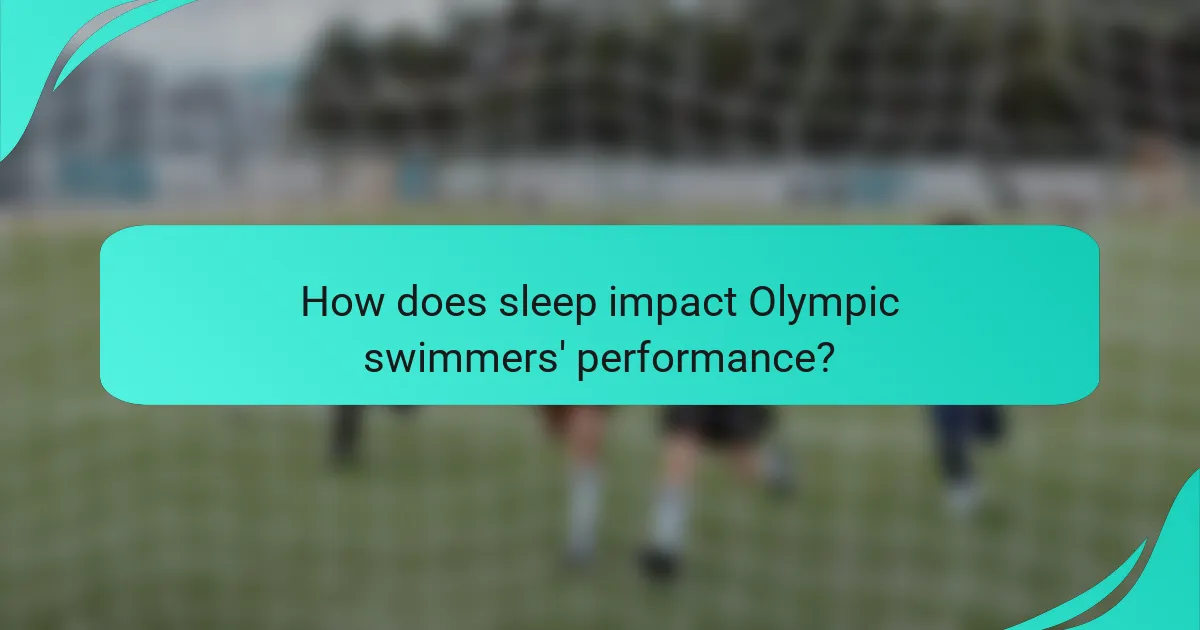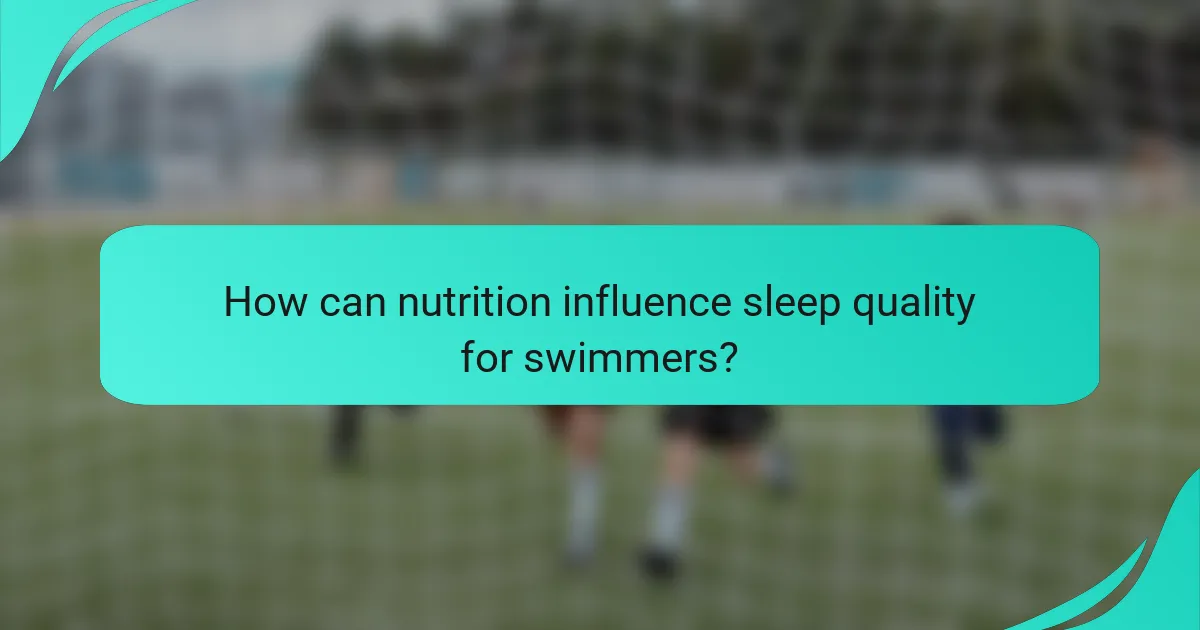Sleep plays a crucial role in the performance of Olympic swimmers, as it enhances recovery, sharpens focus, and boosts energy levels. By prioritizing adequate rest, athletes can optimize their training and excel in competitions. Implementing effective sleep strategies, such as maintaining a consistent schedule and creating a conducive sleep environment, is essential for ensuring they are well-rested and ready to perform at their peak.

How does sleep impact Olympic swimmers’ performance?
Sleep significantly influences Olympic swimmers’ performance by enhancing recovery, improving focus, and increasing energy levels. Adequate sleep allows athletes to train effectively and perform at their best during competitions.
Enhanced recovery
Sleep plays a crucial role in the recovery process for Olympic swimmers. During deep sleep, the body repairs muscles, synthesizes proteins, and releases growth hormones, all of which are vital for recovery after intense training sessions.
Swimmers should aim for 7-9 hours of quality sleep per night to optimize recovery. Establishing a consistent sleep schedule and creating a restful environment can further enhance the benefits of sleep.
Improved focus and concentration
Quality sleep directly affects an athlete’s cognitive functions, including focus and concentration. Swimmers who prioritize sleep are better able to maintain mental clarity during training and competitions, which is essential for executing complex techniques and strategies.
To improve focus, swimmers can incorporate short naps of 20-30 minutes into their routine, especially after intense training sessions. This can help refresh the mind and enhance overall performance.
Increased energy levels
Sleep is vital for maintaining high energy levels, which are crucial for Olympic swimmers during long training sessions and competitions. Insufficient sleep can lead to fatigue, decreased motivation, and impaired physical performance.
Swimmers should monitor their sleep patterns and ensure they are getting enough rest. Simple practices like limiting screen time before bed and engaging in relaxation techniques can help improve sleep quality and, consequently, energy levels.

What are effective sleep strategies for Olympic swimmers?
Effective sleep strategies for Olympic swimmers include maintaining a consistent sleep schedule, creating an optimal sleep environment, and establishing pre-sleep routines. These practices help enhance recovery, improve performance, and ensure athletes are well-rested for training and competition.
Consistent sleep schedule
Maintaining a consistent sleep schedule is crucial for Olympic swimmers to regulate their circadian rhythms. Athletes should aim to go to bed and wake up at the same time every day, even on weekends, to promote better sleep quality.
Swimmers can benefit from a sleep duration of 7 to 9 hours per night, depending on individual needs. Tracking sleep patterns through apps or journals can help identify optimal sleep times and any disruptions.
Optimal sleep environment
Creating an optimal sleep environment involves minimizing noise, light, and temperature disruptions. Swimmers should aim for a dark, quiet room with a cool temperature, ideally between 16-20°C (60-68°F), to facilitate deeper sleep.
Investing in quality bedding, blackout curtains, and white noise machines can significantly enhance sleep quality. Additionally, limiting screen time before bed helps reduce blue light exposure, which can interfere with melatonin production.
Pre-sleep routines
Establishing pre-sleep routines can signal to the body that it is time to wind down. Swimmers should consider engaging in relaxing activities such as reading, stretching, or meditation for 30-60 minutes before bedtime.
Avoiding stimulants like caffeine and heavy meals in the hours leading up to sleep is essential. Instead, light snacks rich in carbohydrates and proteins, like yogurt or a banana, can promote better sleep without causing discomfort.

What are the consequences of poor sleep for Olympic swimmers?
Poor sleep can significantly hinder Olympic swimmers’ performance, recovery, and overall well-being. Insufficient rest leads to a range of negative outcomes, impacting both physical capabilities and mental health.
Decreased performance
When Olympic swimmers experience inadequate sleep, their performance can suffer dramatically. Sleep deprivation can lead to slower reaction times, reduced endurance, and impaired decision-making during competitions. Studies suggest that even a few nights of poor sleep can result in performance drops of 10-20% or more.
To maintain peak performance, swimmers should aim for 7-9 hours of quality sleep per night. Establishing a consistent sleep schedule and creating a restful environment can help enhance sleep quality.
Increased injury risk
Lack of sleep increases the likelihood of injuries among Olympic swimmers. Fatigue can lead to decreased focus and coordination, making swimmers more prone to accidents and overuse injuries. Research indicates that athletes who do not get enough sleep may experience injury rates that are significantly higher than those who prioritize rest.
Swimmers should be mindful of their sleep habits, as prioritizing recovery can help mitigate injury risks. Incorporating rest days and listening to their bodies can further support injury prevention strategies.
Negative mental health effects
Insufficient sleep can adversely affect the mental health of Olympic swimmers, leading to increased stress, anxiety, and mood swings. Poor sleep quality is linked to lower motivation and higher levels of burnout, which can impact training and competition performance.
To combat these effects, swimmers should practice good sleep hygiene, such as limiting screen time before bed and engaging in relaxation techniques. Seeking support from coaches and mental health professionals can also be beneficial in managing stress and maintaining a positive mindset.

How can nutrition influence sleep quality for swimmers?
Nutrition plays a crucial role in influencing sleep quality for swimmers by affecting energy levels, recovery, and overall health. Proper meal timing, hydration, and specific nutrients can significantly enhance sleep patterns and performance.
Timing of meals
The timing of meals is essential for swimmers to optimize sleep quality. Eating too close to bedtime can lead to discomfort and disrupt sleep, while consuming a balanced meal a few hours before sleep can promote better rest. Aim to have the last meal at least 2-3 hours before going to bed.
Incorporating lighter snacks, such as yogurt or a banana, closer to bedtime can help maintain energy levels without causing digestive issues. This approach helps swimmers recover and prepare for the next day’s training.
Hydration levels
Maintaining proper hydration is vital for sleep quality among swimmers. Dehydration can lead to discomfort and restless nights, while adequate hydration supports overall bodily functions. Swimmers should aim to drink water consistently throughout the day, adjusting intake based on training intensity and duration.
It’s important to monitor hydration levels, especially before bedtime. Limiting fluid intake in the evening can prevent nighttime awakenings for bathroom trips, thus improving sleep continuity.
Specific nutrients for sleep
Certain nutrients can enhance sleep quality for swimmers. Magnesium, found in foods like nuts, seeds, and leafy greens, can help relax muscles and promote restful sleep. Additionally, foods rich in tryptophan, such as turkey and dairy products, can aid in the production of melatonin, the hormone responsible for regulating sleep cycles.
Including complex carbohydrates, like whole grains, can also support sleep by promoting serotonin production. Swimmers should aim for a balanced diet that incorporates these nutrients to improve their overall sleep quality and recovery.

What role does technology play in monitoring sleep?
Technology plays a crucial role in monitoring sleep by providing data-driven insights that help athletes, including Olympic swimmers, optimize their rest. Through various devices and applications, swimmers can track sleep patterns, quality, and duration, enabling them to make informed adjustments to their routines.
Wearable sleep trackers
Wearable sleep trackers, such as smartwatches and fitness bands, monitor sleep stages and overall duration. These devices often use sensors to detect movement and heart rate, providing insights into how restful sleep is. Swimmers can benefit from tracking metrics like total sleep time and sleep efficiency to identify patterns that may affect performance.
When selecting a wearable, consider battery life, comfort, and compatibility with other health apps. Popular options include Fitbit, Garmin, and WHOOP, each offering unique features tailored to athletes.
Sleep apps for analysis
Sleep analysis apps can complement wearable trackers by providing deeper insights into sleep quality. These apps often analyze data collected from wearables or smartphones to generate reports on sleep cycles, disturbances, and trends over time. Swimmers can use this information to pinpoint issues such as insomnia or irregular sleep patterns.
Many apps, like Sleep Cycle and Pillow, offer additional features such as guided relaxation techniques and alarms that wake users during lighter sleep phases, enhancing overall sleep quality.
Smart home devices for sleep optimization
Smart home devices can create an optimal sleep environment, which is essential for recovery. Smart thermostats can adjust room temperature, while smart lighting can simulate natural light patterns to promote better sleep hygiene. These adjustments can significantly enhance the quality of rest for swimmers.
Consider integrating devices like smart speakers for white noise or smart blinds that block out light. Ensuring a quiet, dark, and cool sleeping environment can lead to improved sleep quality, which is vital for athletic performance.
